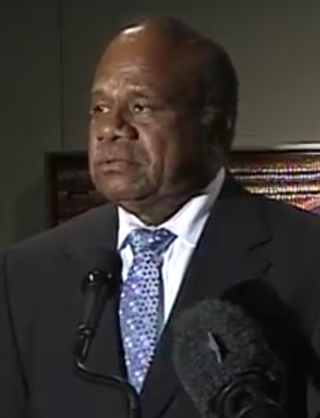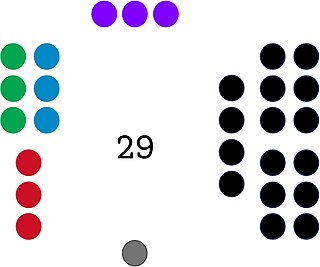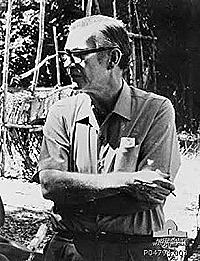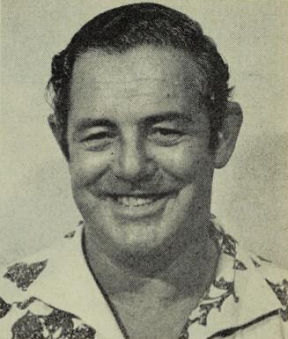Related Research Articles

Sir Rabbie Langanai Namaliu was a Papua New Guinean politician. He served as the fourth prime minister of Papua New Guinea from 4 July 1988 to 17 July 1992 as leader of the Pangu Party.

Sir Paulias Nguna Matane was a Papua New Guinean politician who served as the eighth Governor-General of Papua New Guinea from 29 June 2004 to 13 December 2010. His memoir My Childhood in New Guinea has been on the school curriculum since the 1970s. He was a long-time contributor and columnist for The National.
SirJohn Kaputin, CMG is a Papua New Guinean athlete and politician.
The Tolai are the indigenous people of the Gazelle Peninsula and the Duke of York Islands of East New Britain in the New Guinea Islands region of Papua New Guinea. They are ethnically close kin to the peoples of adjacent New Ireland and tribes like the Tanga people and are thought to have migrated to the Gazelle Peninsula in relatively recent times, displacing the Baining people who were driven westwards.

The Legislative Council of Papua and New Guinea was a legislative body in Papua New Guinea between 1951 and 1963. It was established by the Papua and New Guinea Act 1949 of Australia, which provided for the combined administration of the Territory of Papua and Territory of New Guinea under the United Nations trust territory system. It had the power to make Ordinances for the "peace, order and good government" of the territory, subject to the assent of the Australian-appointed Administrator.

Australian rules football in Papua New Guinea (PNG) is a developing team sport which was initially introduced by Australian servicemen during World War II. The governing body for the sport is the PNG Rules Football Council, with the development body being AFL PNG. The junior development version is known locally as Niukick. Regionally, AFL PNG is affiliated with AFL Oceania.

The Gazelle Peninsula is a large peninsula in northeastern East New Britain, Papua New Guinea located on the island of New Britain within the Bismarck Archipelago, situated in the southwestern Pacific Ocean. The Rabaul caldera is located on the northern tip of the peninsula. Upon the Gazelle Peninsula are the Baining Mountains, of which the highest point is Mount Sinewit at 2,063 m (6,768 ft). The Gazelle Peninsula houses Vulcan Crater and Mount Tavurvur, both of which conducted volcanic activity in the 20th and 21st centuries and have provided extremely fertile soils. The body of the Gazelle Peninsula is about 80 km (50 mi). The southern isthmus upon which the Gazelle Peninsula is connected to the main body of East New Britain is reduced to about 32 km (20 mi).

The Territory of Papua and New Guinea, officially the Administrative Union of the Territory of Papua and the Territory of New Guinea, was established by an administrative union between the Australian-administered territories of Papua and New Guinea in 1949. In December 1971, the name of the Territory changed to "Papua New Guinea" and in 1975 it became the Independent State of Papua New Guinea.

Jack Emanuel was an Australian colonial administrator who served as district commissioner in the East New Britain district of Papua New Guinea who was posthumously awarded the George Cross, the highest British award for bravery out of combat, for gallantry displayed between July 1969 and 19 August 1971. Emanuel served as a police officer and fireman in Australia before accepting a posting as patrol officer (kiap) to the Australian-administered United Nations trust territory of New Guinea, shortly after the Second World War. Emanuel was appointed acting district commissioner for East New Britain in 1969, and was confirmed in this role in 1971. He was well-respected as a local government official and noted for his willingness to negotiate resolutions to local disputes without police escort. Emanuel was trying to discuss a resolution to a land dispute between European settlers and the Tolai people in August 1971 when he was stabbed to death during negotiations. His killers were brought to trial and his death shocked the Tolai who largely abandoned the dispute.
Michael John Manning OBE was an Australian-born Papua New Guinean anti-corruption activist and economist. Manning served as the second Chairman of Transparency International PNG (TIPNG), one of Papua New Guinea's largest organizations dedicated to eradicating corruption, from 2003 until 2008. He was a naturalized citizen of Papua New Guinea.
Nicholas Brokam was a Papua New Guinean politician. He was a member of the Legislative Council and House of Assembly between 1961 and 1968, also serving as Under-Secretary for Economic Affairs and Information and Extension Services.

Donald Barrett was an Australian planter, army major, politician and sports coach in the Territory of Papua and New Guinea. He served as a member of the Legislative Council and House of Assembly in two spells between 1951 and 1968.

Matthias Tutanava Toliman was a Papua New Guinean politician. He served as a member of the House of Assembly between 1964 and 1973, also holding ministerial roles from 1964 until 1972.

John Keith McCarthy was an Australian public servant in the Territory of Papua and New Guinea. He rose to become Director of Agriculture, also serving as a member of the Legislative Council and House of Assembly.
John Herbert Jones was an Australian public servant. He spent most of his career in Papua and New Guinea, serving as an official member of the Legislative Council between 1951 and 1953.
John Lester Chipper was an English-born Papua New Guinean businessman and politician. He served in the Legislative Council in two spells between 1959 and 1964 and headed the local council of Rabaul for several years.
Oala Oala-Rarua was a Papua New Guinean educator, civil servant, trade unionist, politician and diplomat. He served as a member of the House of Assembly and Assistant Minister for the Treasury between 1968 and 1972, later becoming the first Lord Mayor of Port Moresby and High Commissioner to Australia.
John Bexley Sedgers was an Australian businessman. He spent much of his career in the Territory of Papua and New Guinea, where he served in the Legislative Council from 1951 to 1954.

Sir Pita Simogun was a Papua New Guinean policeman, farmer and politician. He served as a member of the Legislative Council from 1951 to 1961 and then as a member of the House of Assembly from 1964 to 1968, during which time he was also Parliamentary Under-Secretary for Police.
Vin ToBaining was one of the first six elected indigenous members of the colonial-era Legislative Council of Papua and New Guinea, between 1961 and 1963. Subsequently, he was involved in the formation of the Pangu Party in 1967, which went on to form the government of Papua New Guinea (PNG) when the country became independent in 1975.
References
- ↑ Australian Representation Current Notes on International Affairs, May 1961
- 1 2 3 4 Courts posting Papua New Guinea Post-Courier, 12 January 1978, p12
- 1 2 Jubilee's last wish unity for Tolai people Papua New Guinea Post-Courier, 30 October 1979, p19
- ↑ Trusteeship Council: Australian Delegation Current Notes on International Affairs, May 1961
- ↑ Papua New Guinea Election Results 1972–2012 Development Policy Centre
- ↑ Ephraim Jubilee Pacific Islands Monthly, March 1980